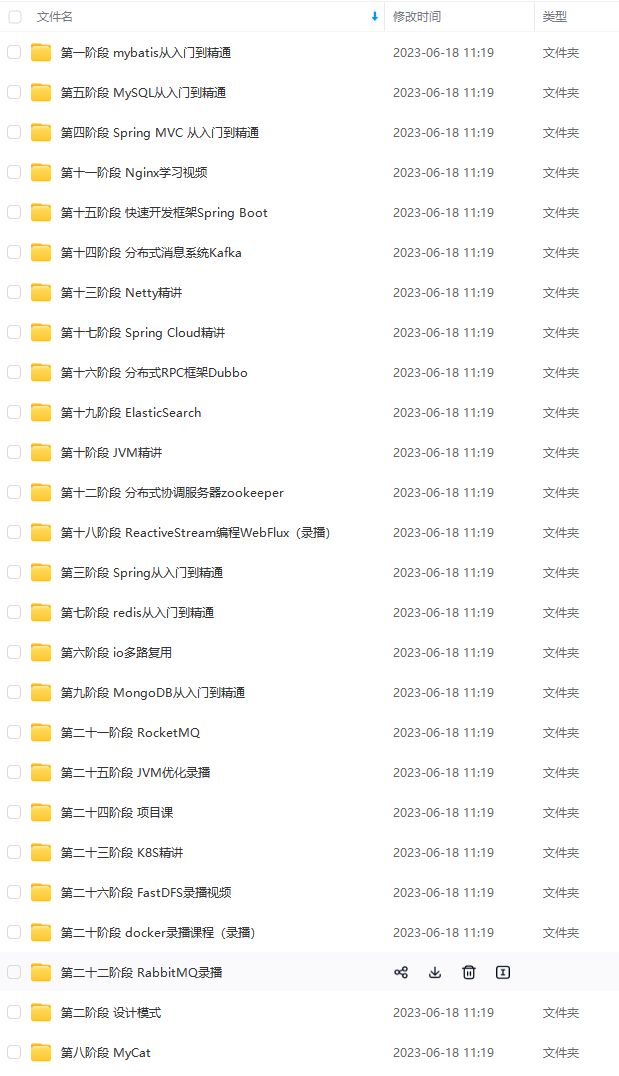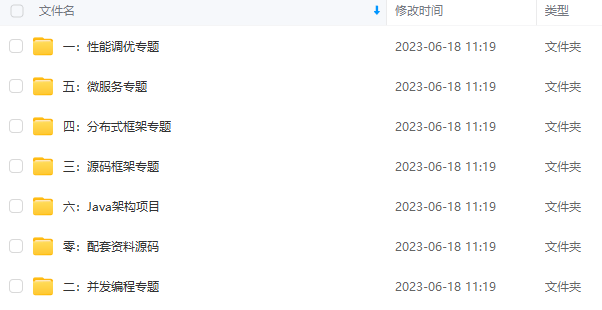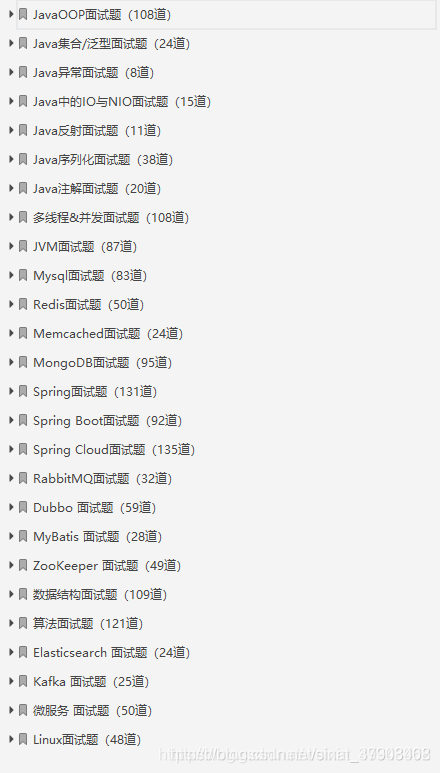前言
==
当线上出现问题的时候,最最最重要的是定位问题。一旦定位到问题了,一切都好办了。但是这个定位问题,需要的不仅仅是理论知识,还需要丰富的实操经验。而丰富的经验从哪里来呢,就是对于工具的运用和数据的分析中来,接下来主要介绍一下java中如何去获取JVM跟os的信息?
下面让我们直接进入主题:
JAVA代码里如何去获取JVM/OS的运行信息呢?
=========================
-
Jvm信息使用ManagementFactory去获取
-
OS运行信息推荐使用oshi去获取
com.github.oshi
oshi-core
5.7.5
获取jvm运行内存信息
===========
格式化内存大小类
package io.github.quickmsg.metric.utils;
import java.text.DecimalFormat;
/**
- @author coding途中
*/
public class FormatUtils {
/**
-
单位转换
-
@param byteNumber number
-
@return desc
*/
public static String formatByte(long byteNumber) {
//换算单位
double FORMAT = 1024.0;
double kbNumber = byteNumber / FORMAT;
if (kbNumber < FORMAT) {
return new DecimalFormat(“#.##KB”).format(kbNumber);
}
double mbNumber = kbNumber / FORMAT;
if (mbNumber < FORMAT) {
return new DecimalFormat(“#.##MB”).format(mbNumber);
}
double gbNumber = mbNumber / FORMAT;
if (gbNumber < FORMAT) {
return new DecimalFormat(“#.##GB”).format(gbNumber);
}
double tbNumber = gbNumber / FORMAT;
return new DecimalFormat(“#.##TB”).format(tbNumber);
}
}
废话不多说直接上代码:
- 第一个种方法通过ManagementFactory获取MemoryMXBean
MemoryMXBean mxb = ManagementFactory.getMemoryMXBean();
//堆
System.out.println(“Max:” +FormatUtils.formatByte(mxb.getHeapMemoryUsage().getMax())); //Max:1776MB
System.out.println(“Init:” + FormatUtils.formatByte(mxb.getHeapMemoryUsage().getInit())); //Init:126MB
System.out.println(“Committed:” + FormatUtils.formatByte(mxb.getHeapMemoryUsage().getCommitted())); //Committed:121MB
System.out.println(“Used:” + FormatUtils.formatByte(mxb.getHeapMemoryUsage().getUsed())); //Used:7MB
System.out.println(mxb.getHeapMemoryUsage().toString());
//直接内存
System.out.println(“Max:” +FormatUtils.formatByte(mxb.getNonHeapMemoryUsage().getMax())); //Max:0MB
System.out.println(“Init:” + FormatUtils.formatByte(mxb.getNonHeapMemoryUsage().getInit())); //Init:2MB
System.out.println(“Committed:” + FormatUtils.formatByte(mxb.getNonHeapMemoryUsage().getCommitted())); //Committed:8MB
System.out.println(“Used:” + FormatUtils.formatByte(mxb.getNonHeapMemoryUsage().getUsed())); //Used:7MB
System.out.println(mxb.getNonHeapMemoryUsage().toString());
- 使用Runtime对象去获取
JSONObject cpuInfo = new JSONObject();
Properties props = System.getProperties();
Runtime runtime = Runtime.getRuntime();
long jvmTotalMemoryByte = runtime.totalMemory();
long freeMemoryByte = runtime.freeMemory();
//jvm总内存
cpuInfo.put(“total”, FormatUtils.formatByte(jvmTotalMemoryByte));
//空闲空间
cpuInfo.put(“free”, FormatUtils.formatByte(freeMemoryByte));
//jvm最大可申请
cpuInfo.put(“max”, FormatUtils.formatByte(runtime.maxMemory()));
//jvm已使用内存
cpuInfo.put(“user”, FormatUtils.formatByte(jvmTotalMemoryByte - freeMemoryByte));
//jvm内存使用率
cpuInfo.put(“usageRate”, new DecimalFormat(“#.##%”).format((jvmTotalMemoryByte - freeMemoryByte) * 1.0 / jvmTotalMemoryByte));
//jdk版本
cpuInfo.put(“jdkVersion”, props.getProperty(“java.version”));
//jdk路径
cpuInfo.put(“jdkHome”, props.getProperty(“java.home”));
System.out.println(cpuInfo);
获取jvm运行线程信息
===========
ThreadMXBean threadBean = ManagementFactory.getThreadMXBean();
Map<String, Number> map = new LinkedHashMap<String, Number>();
// 线程总数
map.put(“jvm.thread.count”, threadBean.getThreadCount());
// 守护线程总数
map.put(“jvm.thread.daemon.count”, threadBean.getDaemonThreadCount());
// 开启线程总数
map.put(“jvm.thread.totalstarted.count”, threadBean.getTotalStartedThreadCount());
// 获取线程详细信息
ThreadInfo[] threadInfos = threadBean.getThreadInfo(threadBean.getAllThreadIds())
int newThreadCount = 0;
int runnableThreadCount = 0;
int blockedThreadCount = 0;
int waitThreadCount = 0;
int timeWaitThreadCount = 0;
int terminatedThreadCount = 0;
if (threadInfos != null) {
for (ThreadInfo threadInfo : threadInfos) {
if (threadInfo != null) {
switch (threadInfo.getThreadState()) {
case NEW:
newThreadCount++;
break;
case RUNNABLE:
runnableThreadCount++;
break;
case BLOCKED:
blockedThreadCount++;
break;
case WAITING:
waitThreadCount++;
break;
case TIMED_WAITING:
timeWaitThreadCount++;
break;
case TERMINATED:
terminatedThreadCount++;
break;
default:
break;
}
} else {
terminatedThreadCount++;
}
}
// 新建线程数
map.put(“jvm.thread.new.count”, newThreadCount);
// 运行线程数
map.put(“jvm.thread.runnable.count”, runnableThreadCount);
// 阻塞线程数
map.put(“jvm.thread.blocked.count”, blockedThreadCount);
// 等待线程数
map.put(“jvm.thread.waiting.count”, waitThreadCount);
// 等待超时线程数
map.put(“jvm.thread.time_waiting.count”, timeWaitThreadCount);
// 死亡线程数
map.put(“jvm.thread.terminated.count”, terminatedThreadCount);
long[] ids = threadBean.findDeadlockedThreads();
map.put(“jvm.thread.deadlock.count”, ids == null ? 0 : ids.length);
获取系统cpu信息
=========
直接使用oshi的系统api
JSONObject cpuInfo = new JSONObject();
CentralProcessor processor = hardware.getProcessor();
// CPU信息
long[] prevTicks = processor.getSystemCpuLoadTicks();
Util.sleep(OSHI_WAIT_SECOND);
long[] ticks = processor.getSystemCpuLoadTicks();
long nice = ticks[CentralProcessor.TickType.NICE.getIndex()] - prevTicks[CentralProcessor.TickType.NICE.getIndex()];
long irq = ticks[CentralProcessor.TickType.IRQ.getIndex()] - prevTicks[CentralProcessor.TickType.IRQ.getIndex()];
long softirq = ticks[CentralProcessor.TickType.SOFTIRQ.getIndex()] - prevTicks[CentralProcessor.TickType.SOFTIRQ.getIndex()];
long steal = ticks[CentralProcessor.TickType.STEAL.getIndex()] - prevTicks[CentralProcessor.TickType.STEAL.getIndex()];
long cSys = ticks[CentralProcessor.TickType.SYSTEM.getIndex()] - prevTicks[CentralProcessor.TickType.SYSTEM.getIndex()];
long user = ticks[CentralProcessor.TickType.USER.getIndex()] - prevTicks[CentralProcessor.TickType.USER.getIndex()];
long iowait = ticks[CentralProcessor.TickType.IOWAIT.getIndex()] - prevTicks[CentralProcessor.TickType.IOWAIT.getIndex()];
long idle = ticks[CentralProcessor.TickType.IDLE.getIndex()] - prevTicks[CentralProcessor.TickType.IDLE.getIndex()];
long totalCpu = user + nice + cSys + idle + iowait + irq + softirq + steal;
//cpu核数
cpuInfo.put(“cpuNum”, processor.getLogicalProcessorCount());
//cpu系统使用率
cpuInfo.put(“cSys”, new DecimalFormat(“#.##%”).format(cSys * 1.0 / totalCpu));
//cpu用户使用率
cpuInfo.put(“user”, new DecimalFormat(“#.##%”).format(user * 1.0 / totalCpu));
//cpu当前等待率
cpuInfo.put(“iowait”, new DecimalFormat(“#.##%”).format(iowait * 1.0 / totalCpu));
//cpu当前使用率
cpuInfo.put(“idle”, new DecimalFormat(“#.##%”).format(1.0 - (idle * 1.0 / totalCpu)));
System.out.println(cpuInfo);
获取系统内存信息(非jvm)
==============
package io.github.quickmsg.metric.category;
import lombok.extern.slf4j.Slf4j;
import oshi.SystemInfo;
import oshi.hardware.*;
import oshi.software.os.FileSystem;
import oshi.software.os.NetworkParams;
import oshi.software.os.OSFileStore;
import oshi.software.os.OperatingSystem;
import oshi.util.FormatUtil;
import java.util.Arrays;
import java.util.List;
/**
-
系统数据
-
@author luxurong
*/
@Slf4j
public class SysMetric {
public static void main(String[] args) {
// Options: ERROR > WARN > INFO > DEBUG > TRACE
log.info(“Initializing System…”);
SystemInfo si = new SystemInfo();
HardwareAbstractionLayer hal = si.getHardware();
OperatingSystem os = si.getOperatingSystem();
System.out.println(os);
log.info(“Checking computer system…”);
printComputerSystem(hal.getComputerSystem());
log.info(“Checking Processor…”);
printProcessor(hal.getProcessor());
log.info(“Checking Memory…”);
printMemory(hal.getMemory());
log.info(“Checking CPU…”);
printCpu(hal.getProcessor());
log.info(“Checking Sensors…”);
printSensors(hal.getSensors());
log.info(“Checking Power sources…”);
printPowerSources(hal.getPowerSources());
log.info(“Checking Disks…”);
printDisks(hal.getDiskStores());
log.info(“Checking File System…”);
printFileSystem(os.getFileSystem());
log.info(“Checking Network interfaces…”);
printNetworkInterfaces(hal.getNetworkIFs());
log.info(“Checking Network parameterss…”);
printNetworkParameters(os.getNetworkParams());
// hardware: displays
log.info(“Checking Displays…”);
printDisplays(hal.getDisplays());
// hardware: USB devices
log.info(“Checking USB Devices…”);
printUsbDevices(hal.getUsbDevices(true));
}
private static void printComputerSystem(final ComputerSystem computerSystem) {
System.out.println("manufacturer: " + computerSystem.getManufacturer());
System.out.println("model: " + computerSystem.getModel());
System.out.println("serialnumber: " + computerSystem.getSerialNumber());
final Firmware firmware = computerSystem.getFirmware();
System.out.println(“firmware:”);
System.out.println(" manufacturer: " + firmware.getManufacturer());
System.out.println(" name: " + firmware.getName());
System.out.println(" description: " + firmware.getDescription());
System.out.println(" version: " + firmware.getVersion());
final Baseboard baseboard = computerSystem.getBaseboard();
System.out.println(“baseboard:”);
System.out.println(" manufacturer: " + baseboard.getManufacturer());
System.out.println(" model: " + baseboard.getModel());
System.out.println(" version: " + baseboard.getVersion());
System.out.println(" serialnumber: " + baseboard.getSerialNumber());
}
private static void printProcessor(CentralProcessor processor) {
System.out.println(processor);
System.out.println(" " + processor.getPhysicalPackageCount() + " physical CPU package(s)");
System.out.println(" " + processor.getPhysicalProcessorCount() + " physical CPU core(s)");
System.out.println("Identifier: " + processor.getProcessorIdentifier());
System.out.println("ProcessorID: " + processor.getProcessorIdentifier());
}
private static void printMemory(GlobalMemory memory) {
System.out.println("Memory: " + FormatUtil.formatBytes(memory.getAvailable()) + “/”
- FormatUtil.formatBytes(memory.getTotal()));
System.out.println("Swap used: " + FormatUtil.formatBytes(memory.getVirtualMemory().getSwapUsed()) + “/”
- FormatUtil.formatBytes(memory.getVirtualMemory().getSwapTotal()));
}
private static void printCpu(CentralProcessor processor) {
System.out.println(
"Context Switches/Interrupts: " + processor.getContextSwitches() + " / " + processor.getInterrupts());
long[] prevTicks = processor.getSystemCpuLoadTicks();
System.out.println(“CPU, IOWait, and IRQ ticks @ 0 sec:” + Arrays.toString(prevTicks));
// Wait a second…
long[] ticks = processor.getSystemCpuLoadTicks();
System.out.println(“CPU, IOWait, and IRQ ticks @ 1 sec:” + Arrays.toString(ticks));
long user = ticks[CentralProcessor.TickType.USER.getIndex()] - prevTicks[CentralProcessor.TickType.USER.getIndex()];
long nice = ticks[CentralProcessor.TickType.NICE.getIndex()] - prevTicks[CentralProcessor.TickType.NICE.getIndex()];
long sys = ticks[CentralProcessor.TickType.SYSTEM.getIndex()] - prevTicks[CentralProcessor.TickType.SYSTEM.getIndex()];
long idle = ticks[CentralProcessor.TickType.IDLE.getIndex()] - prevTicks[CentralProcessor.TickType.IDLE.getIndex()];
long iowait = ticks[CentralProcessor.TickType.IOWAIT.getIndex()] - prevTicks[CentralProcessor.TickType.IOWAIT.getIndex()];
long irq = ticks[CentralProcessor.TickType.IRQ.getIndex()] - prevTicks[CentralProcessor.TickType.IRQ.getIndex()];
long softirq = ticks[CentralProcessor.TickType.SOFTIRQ.getIndex()] - prevTicks[CentralProcessor.TickType.SOFTIRQ.getIndex()];
long steal = ticks[CentralProcessor.TickType.STEAL.getIndex()] - prevTicks[CentralProcessor.TickType.STEAL.getIndex()];
long totalCpu = user + nice + sys + idle + iowait + irq + softirq + steal;
System.out.format(
“User: %.1f%% Nice: %.1f%% System: %.1f%% Idle: %.1f%% IOwait: %.1f%% IRQ: %.1f%% SoftIRQ: %.1f%% Steal: %.1f%%%n”,
100d * user / totalCpu, 100d * nice / totalCpu, 100d * sys / totalCpu, 100d * idle / totalCpu,
100d * iowait / totalCpu, 100d * irq / totalCpu, 100d * softirq / totalCpu, 100d * steal / totalCpu);
double[] loadAverage = processor.getSystemLoadAverage(3);
System.out.println(“CPU load averages:” + (loadAverage[0] < 0 ? " N/A" : String.format(" %.2f", loadAverage[0]))
-
(loadAverage[1] < 0 ? " N/A" : String.format(" %.2f", loadAverage[1]))
-
(loadAverage[2] < 0 ? " N/A" : String.format(" %.2f", loadAverage[2])));
}
private static void printSensors(Sensors sensors) {
System.out.println(“Sensors:”);
System.out.format(" CPU Temperature: %.1f°C%n", sensors.getCpuTemperature());
System.out.println(" Fan Speeds: " + Arrays.toString(sensors.getFanSpeeds()));
System.out.format(" CPU Voltage: %.1fV%n", sensors.getCpuVoltage());
}
private static void printPowerSources(List powerSources) {
StringBuilder sb = new StringBuilder("Power: ");
if (powerSources.size() == 0) {
sb.append(“Unknown”);
} else {
double timeRemaining = powerSources.get(0).getTimeRemainingInstant();
if (timeRemaining < -1d) {
sb.append(“Charging”);
} else if (timeRemaining < 0d) {
sb.append(“Calculating time remaining”);
} else {
sb.append(String.format(“%d:%02d remaining”, (int) (timeRemaining / 3600),
(int) (timeRemaining / 60) % 60));
}
}
for (PowerSource pSource : powerSources) {
sb.append(String.format(“%n %s @ %.1f%%”, pSource.getName(), pSource.getTimeRemainingInstant() * 100d));
}
System.out.println(sb.toString());
}
private static void printDisks(List diskStores) {
System.out.println(“Disks:”);
for (HWDiskStore disk : diskStores) {
boolean readwrite = disk.getReads() > 0 || disk.getWrites() > 0;
System.out.format(" %s: (model: %s - S/N: %s) size: %s, reads: %s (%s), writes: %s (%s), xfer: %s ms%n",
disk.getName(), disk.getModel(), disk.getSerial(),
disk.getSize() > 0 ? FormatUtil.formatBytesDecimal(disk.getSize()) : “?”,
readwrite ? disk.getReads() : “?”, readwrite ? FormatUtil.formatBytes(disk.getReadBytes()) : “?”,
readwrite ? disk.getWrites() : “?”, readwrite ? FormatUtil.formatBytes(disk.getWriteBytes()) : “?”,
readwrite ? disk.getTransferTime() : “?”);
List partitions = disk.getPartitions();
if (partitions == null) {
// TODO Remove when all OS’s implemented
continue;
}
for (HWPartition part : partitions) {
System.out.format(" |-- %s: %s (%s) Maj:Min=%d:%d, size: %s%s%n", part.getIdentification(),
part.getName(), part.getType(), part.getMajor(), part.getMinor(),
FormatUtil.formatBytesDecimal(part.getSize()),
part.getMountPoint().isEmpty() ? “” : " @ " + part.getMountPoint());
}
}
}
private static void printFileSystem(FileSystem fileSystem) {
System.out.println(“File System:”);
System.out.format(" File Descriptors: %d/%d%n", fileSystem.getOpenFileDescriptors(),
fileSystem.getMaxFileDescriptors());
List fsArray = fileSystem.getFileStores();
for (OSFileStore fs : fsArray) {
long usable = fs.getUsableSpace();
long total = fs.getTotalSpace();
System.out.format(
" %s (%s) [%s] %s of %s free (%.1f%%) is %s "
-
(fs.getLogicalVolume() != null && fs.getLogicalVolume().length() > 0 ? “[%s]” : “%s”)
-
" and is mounted at %s%n",
fs.getName(), fs.getDescription().isEmpty() ? “file system” : fs.getDescription(), fs.getType(),
FormatUtil.formatByt
es(usable), FormatUtil.formatBytes(fs.getTotalSpace()), 100d * usable / total,
fs.getVolume(), fs.getLogicalVolume(), fs.getMount());
}
}
private static void printNetworkInterfaces(List networkIFs) {
System.out.println(“Network interfaces:”);
for (NetworkIF net : networkIFs) {
System.out.format(" Name: %s (%s)%n", net.getName(), net.getDisplayName());
System.out.format(" MAC Address: %s %n", net.getMacaddr());
System.out.format(" MTU: %s, Speed: %s %n", net.getMTU(), FormatUtil.formatValue(net.getSpeed(), “bps”));
System.out.format(" IPv4: %s %n", Arrays.toString(net.getIPv4addr()));
System.out.format(" IPv6: %s %n", Arrays.toString(net.getIPv6addr()));
boolean hasData = net.getBytesRecv() > 0 || net.getBytesSent() > 0 || net.getPacketsRecv() > 0
|| net.getPacketsSent() > 0;
System.out.format(" Traffic: received %s/%s%s; transmitted %s/%s%s %n",
hasData ? net.getPacketsRecv() + " packets" : “?”,
hasData ? FormatUtil.formatBytes(net.getBytesRecv()) : “?”,
hasData ? " (" + net.getInErrors() + " err)" : “”,
hasData ? net.getPacketsSent() + " packets" : “?”,
hasData ? FormatUtil.formatBytes(net.getBytesSent()) : “?”,
hasData ? " (" + net.getOutErrors() + " err)" : “”);
}
}
private static void printNetworkParameters(NetworkParams networkParams) {
System.out.println(“Network parameters:”);
System.out.format(" Host name: %s%n", networkParams.getHostName());
System.out.format(" Domain name: %s%n", networkParams.getDomainName());
System.out.format(" DNS servers: %s%n", Arrays.toString(networkParams.getDnsServers()));
System.out.format(" IPv4 Gateway: %s%n", networkParams.getIpv4DefaultGateway());
System.out.format(" IPv6 Gateway: %s%n", networkParams.getIpv6DefaultGateway());
}
private static void printDisplays(List displays) {
System.out.println(“Displays:”);
int i = 0;
for (Display display : displays) {
System.out.println(" Display " + i + “:”);
System.out.println(display.toString());
i++;
}
}
private static void printUsbDevices(List usbDevices) {
System.out.println(“USB Devices:”);
for (UsbDevice usbDevice : usbDevices) {
System.out.println(usbDevice.toString());
}
}
}
最后
小编这些年深知大多数初中级工程师,想要提升自己,往往是自己摸索成长,自己不成体系的自学效果低效漫长且无助。
因此我收集整理了一份《2024年Java全套学习资料》,初衷也很简单,就是希望能够帮助到想自学提升又不知道该从何学起的朋友,同时减轻大家的负担。



由于文件比较大,这里只是将部分目录截图出来,每个节点里面都包含大厂面经、学习笔记、源码讲义、实战项目、讲解视频,并且会持续更新!
如果你需要这些资料,⬅专栏获取
ms.getIpv4DefaultGateway());
System.out.format(" IPv6 Gateway: %s%n", networkParams.getIpv6DefaultGateway());
}
private static void printDisplays(List displays) {
System.out.println(“Displays:”);
int i = 0;
for (Display display : displays) {
System.out.println(" Display " + i + “:”);
System.out.println(display.toString());
i++;
}
}
private static void printUsbDevices(List usbDevices) {
System.out.println(“USB Devices:”);
for (UsbDevice usbDevice : usbDevices) {
System.out.println(usbDevice.toString());
}
}
}
最后
小编这些年深知大多数初中级工程师,想要提升自己,往往是自己摸索成长,自己不成体系的自学效果低效漫长且无助。
因此我收集整理了一份《2024年Java全套学习资料》,初衷也很简单,就是希望能够帮助到想自学提升又不知道该从何学起的朋友,同时减轻大家的负担。
[外链图片转存中…(img-MJ0r1xou-1719679326192)]
[外链图片转存中…(img-LNSMVf6u-1719679326193)]
[外链图片转存中…(img-Z9fBmvnB-1719679326193)]
由于文件比较大,这里只是将部分目录截图出来,每个节点里面都包含大厂面经、学习笔记、源码讲义、实战项目、讲解视频,并且会持续更新!
如果你需要这些资料,⬅专栏获取





















 150
150











 被折叠的 条评论
为什么被折叠?
被折叠的 条评论
为什么被折叠?








